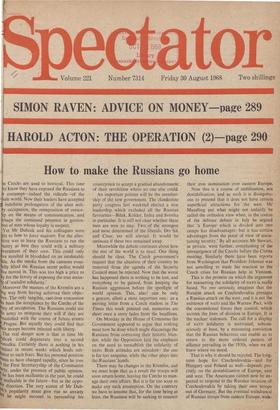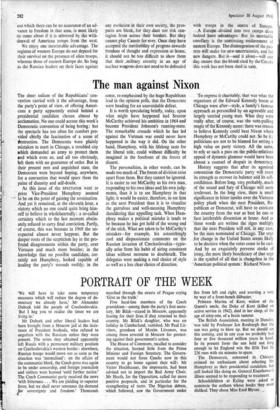How to make the Russians go home
e Czechs are used to betrayal. This time y know they have exposed the Russians to contempt—indeed the ridicule—of the ole world. Now their leaders have accepted indefinite prolongation of the alien mili- ry occupation, the reimposition of censor- ip on the means of communication, and rhaps the continued presence in govern- ent of men whose loyalty is suspect.
Yet Mr Dubcek and his colleagues were 'ht to bow to force majeure. For the alter- tive was to leave the Russians to run the untry as best they could with a military vernment of their own. This could only ye resulted in bloodshed on an intolerable ale. As the smoke from the cannons even- ally lifted the Russian secret police would ye moved in. This was too high a price to ay for the luxury of exposing the true mean- g of 'socialist solidarity.'
Moreover the masters of the Kremlin are a ng way from having achieved their objec- yes. The only tangible, cast-iron concession s been the acceptance by the Czechs of the tiny of occupation. The Russians could use s army to reimpose their will if they are Issatisfied with the course of future events Prague. But equally they could find that eir troops become infected with liberty. The real danger now is that in time Mr abeek could degenerate into a second omulka. Certainly there is nothing in his hfiduct in recent weeks which lends sub- ltalice to such fears. But his personal position i trits to have changed rapidly, since he rose to the First Secretaryship of the Communist ii,arty, under the pressure of public opinion. he has been malleable in the past, he could malleable in the future—but in the oppo- Ite direction. The very extent of Mr Dub- Vsc's popularity must give rise to anxiety countrymen to accept a gradual abandonment of their revolution where no one else could.
An important pointer will be the member- ship of the new government. The clandestine party congress last weekend elected a new leadership which excluded all the Russian favourites—Bilak, Kolder, Indra and Svestka in particular. It is still not clear whether these men are now to Stay. Two of the strongest and most determined of the liberals, Drs Sik and Cisar, are still abroad. It would be ominous if these two remained away.
Meanwhile the debate continues about how the rest of the world is to react. One thing should be clear. The Czech government's request that the situation of their country be removed from the agenda of the Security Council must be rejected. Now that the worst has happened there is nothing to be lost, and everything to be gained, from keeping the Russian aggression before the spotlight of world opinion. This, alas! can be only a gesture, albeit a most important one : as a moving letter from a Czech student in The Times this week pointed out, memories are short once a story fades from the headlines.
On Monday in the House of Commons the Government appeared to argue that nothing must now be done which might discourage the Russians from correcting their historic blun- der, while the Opposition laid the emphasis on the need to reestablish the solidarity of NATO. Both attitudes are mistaken : the one is far too sanguine, while the other plays into the Russians' hands.
There may be changes in the Kremlin, and we must hope that as a result the troops will soon return home, leaving the Czechs to man- age their own affairs. But it is far too soon to make any such assumption. On the contrary we have to assume that, for the time being at least. the Russians will be seeking to reassert Now this is a course of stabilisation, not destabilisation, and as such it is disingenu- ous to pretend that it does not have certain superficial attractions for the west. Mr Maudling put what might not unfairly be called the orthodox view when, in the course of the defence debate in July he argued that 'a Europe which is divided into two camps has disadvantages; but it has certain advantages from the point of view of main- taining security.' By all accounts Mr Stewart. in private, went further, complaining of the intransigence of the Czechs before the Cierna meeting. Similarly there have been reports from Washington that President Johnson was not unwilling to trade his reaction to the Czech crisis for Russian help in Vietnam.
This is the premise on which the argument for reasserting the solidarity of NATO is really based. No one seriously imagines that the Russian attack on Czechoslovakia presages a Russian attack on the west: and it is not the existence of NATO and the Warsaw Pact, with the conventional forces they control, which secures the lines of division in Europe. It is the nuclear stalemate. The call for a display of NATO solidarity is motivated, subcon- sciously at least, by a reassuring conviction that the Russian behaviour can enable us to return to the more ordered pattern of alliance prevailing in the 1950s, when we all knew where we stood. out which there can be no assurance of an ad- vance to freedom in that area, is most likely to come about if it is mirrored by the with- drawal of American troops from the west.
We enjoy one inestimable advantage. The regimes .of western Europe do not depend for their survival on the presence of alien troops, whereas those of eastern Europe do. So long as the Russian leaders set their faces against any evolution in their own society, the pros- pects are bleak, for they dare not risk con- tagion from across their borders. But they cannot play Canute for ever. Once they have accepted the inevitability of progress towards freedom of thought and expression at home, it should not be too difficult to show them that their _military security in an age of nuclear weapons does not need to be defended with troops in the centre of Europe. A Europe divided into two camps does indeed have advantages. But its inevitable corollary is the continuing enslavement of eastern Europe. The disintegration of the pat- tern will make for new uncertainties, and for new dangers. But it—and it alone—will one day ensure that the blood shed by the Czechs this week has not been shed in vain.



































 Previous page
Previous page